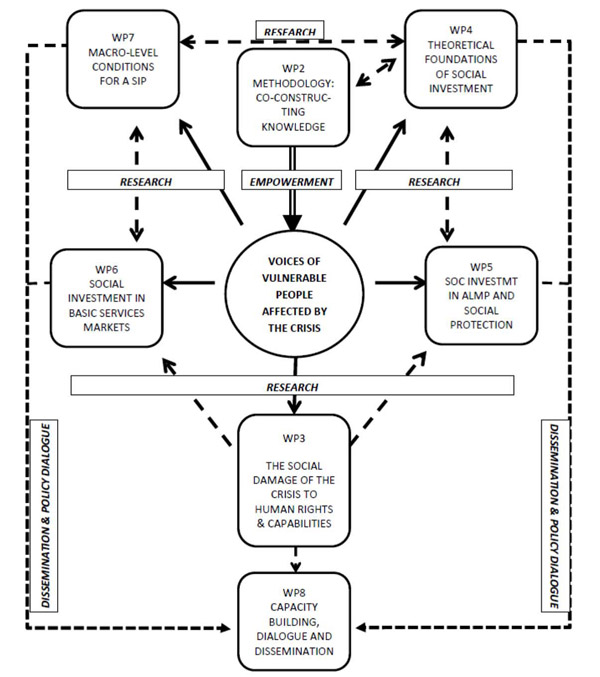Overall structure of the project

This figure shows the project-structure and the mutual links between the work packages. The participative research design (‘crossing of knowledge’) puts vulnerable people at the heart of the process. As this involves a demanding methodology, a specific work package (WP2: methodological support) starts with developing a toolkit and providing training for all teams collecting data; WP2 continues through the whole research period providing ongoing advice. On the substantive side, WP3 starts with a (participative) diagnosis of the social damage caused by the financial crisis.
For the academic researchers, this will be an opportunity to be confronted with the lived experience of vulnerable groupswho will have the chance to reflect on their experience and co‐construct the conceptual framework (human rights, capabilities, social investment etc.) to be used in the next stages of the research.
WP4 will build on the ‘diagnosis’ in developing the theoretical and normative basis for an improved social policy framework. An enriched, multidimensional concept of social investment will be developed, based on human rights and capabilities, and the collective dimension of capabilities (to include civil society, the labour movement, as well as other social movements) will be further explored. This theoretical framework will be used as a background for assessing the policy documents relating to the Social Investment Package as an ‘ex‐ante evaluation’ of the SIP.
The next three WPs focus on specific dimensions of social investment: WP5 deals with active labour market policies and social protection. The enriched theoretical framework will be used to study the impact of national system characteristics and recent policy reforms on the human rights and capabilities of vulnerable groups in the EU (using qualitative and quantitative methods). Similarly, WP6 will concentrate on the (de)regulation of basic service markets.
In WP7, special attention is devoted to the macro‐level conditions for a successful social investment strategy: innovative ways of raising adequate funding; social minimum standards; democratic decision-making, and a reassessment of the subsidiarity principle.
Finally, WP8 invests in capacity building, not just within the research team but also through networking, dissemination, and policy dialogue ‐ throughout the project duration.

 This project has received funding from the European Union’s Horizon 2020 research and innovation programme under grant agreement No 649447. Any dissemination of results must indicate that it reflects only the author’s view and that the Commission is not responsible for any use that may be made of the information it contains.
This project has received funding from the European Union’s Horizon 2020 research and innovation programme under grant agreement No 649447. Any dissemination of results must indicate that it reflects only the author’s view and that the Commission is not responsible for any use that may be made of the information it contains.